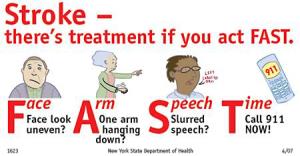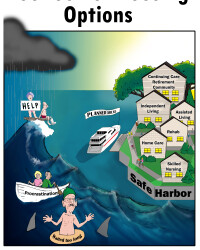by Diane Masson | Apr 12, 2015
What about you? Does one of your loved ones have dementia and still drive? Dementia drivers are jeopardizing other citizens walking in crosswalks and driving. My father-in-law was driving with a diagnosis of macular degeneration. He justified his actions by only driving in the daytime and limiting himself to a 5-mile radius to run errands and go the doctor. As his dementia progressed he got lost driving home within this radius. He chose to give up driving on his own. A friend told me about my mother driving several years ago. They said, “I saw your mom driving today, she can’t even see over the steering wheel. She is looking through the steering wheel in order to see the road.” I was horrified. This was completely unsafe. I still vividly remember the last time I drove with my mom. She was straddling two lanes (on the same side of the road). She said, “Diane, I know this looks bad, but I know exactly what I am doing.” I was terrified. It was the beginning of her dementia. A resident of a senior living community drove into another resident’s balcony. As he was parking the car, the senior hit the gas instead of the brake. After backing up, he made the same mistake again and rammed the balcony a second time. Afterwards, he was disoriented and could not remember how the accident happened or why he hit the gas twice. He did not give up his car keys after this incident. The resident whose balcony was destroyed requested to have the parking place right outside his apartment home, because he...
by Diane Masson | Apr 5, 2015
Many seniors believe Medicare will take care of everything. It is an unfortunate perception that is inaccurate. Two days ago, I was presenting senior living options to a group of seniors. One senior raised their hand and asked how Medicare fit in the picture of paying for senior housing. Here was my answer, “You have worked hard your whole life to have Medicare insurance. Most seniors have Medicare, a HMO and supplemental insurance. These will help you pay for doctors, hospital stays and up to 100 days of skilled nursing care (if you have a qualifying hospital stay). Medicare will not pay for any long-term care such as support in an assisted living community, long-term skilled nursing care or memory care. (I know this was a short version of a long answer.) Many seniors were surprised…here is some info from Medicare: “At least 70 percent of people over 65 will need long-term care services and support at some point. ‘Medicare and most health insurance plans, including Medicare Supplement Insurance (Medigap) policies, don’t pay for this type of care, sometimes called ‘custodial care.’ Long-term care can be provided at home, in the community, in an assisted living facility, or in a nursing home. It’s important to start planning for long-term care now to maintain your independence and to make sure you get the care you may need, in the setting you want, in the future.” This is a quote from the official Medicare and You 2014 Handbook, page 63. Have you encountered this misperception that Medicare will pay for long-term care? Diane Twohy Masson’s new guide book for seniors, “Your Senior Housing...
by Diane Masson | Mar 29, 2015
My sister-in-law witnessed my father-in-law, Bill, having a mini-stroke (TIA) this week. What a heartbreaking story. She was sitting with him in the living room and noticed his face droop on one side. Then his speech became garbled. It was over in two minutes and he could talk fine again. He had no idea it happened. She was understandable traumatized and wanted to talk about it. My husband and I are 1000 miles away and applaud her efforts to care for my father-in-law in her own home till he passes. We both think she is a saint. Through my Internet research it says a TIA is a mini-stroke. TIA’s can be warnings that a bigger stroke can be coming. In my mom’s case, she has had so many TIA’s that she has been diagnosed with vascular dementia. I have never personally witnessed a TIA with my mom. I guess you could say we were lucky it was only a TIA with Bill. Unfortunately, my father-in-law is now on hospice. Hospice is comfort care, so the goal is no hospitals or ambulances if at all possible. Every caregiver, family member and senior living professional should know the signs of a stroke and what to do. Stokes can cause permanent damage. If you get someone to a hospital in time, it can reverse the affects of the stroke. Go to www.strokeassociation.org to learn more. They say you should act FAST! FAST stands for: face drooping, arm weakness, speech difficulty and time to call 911. Have any of you encountered or witnessed a TIA or stroke? Diane Twohy Masson’s new guide...
by Diane Masson | Mar 22, 2015
Finding an affordable memory care or assisted living community can be a daunting task. Even this senior housing guru had to plan strategic questions before touring four memory care communities for my mother-in-law. See the questions HERE. My husband and I flew 1000 miles to Seattle. We only had two days to tour memory care communities in the Seattle area. This required researching the Internet, calling former senior housing colleagues for recommendations and scheduling tours before we left. The timing was tricky because our limited time included visiting with my husband’s mom. My husband created a spreadsheet to compare costs between these four memory care communities. The pricing is so complex that even someone working in the senior living field (like me) had trouble figuring out the monthly cost for my mother-in-law. Care points, care levels or all inclusive costs? Most assisted living and memory care communities seem to have a charge for room and board, then additional costs for care. Pricing can be very gray and feels like an illusion of smoke and mirrors. Care costs can be priced on a point system or a level system. My mother-in-law, Amy, was assessed at 223 points at her current memory care community. Care costs varied dramaticly. Some of our tour guides were actually guessing what level of care or point total she might be, before a nurse could assess her. This is what makes pricing difficult to compare. The community recommends that you to move her in and then they will figure out the monthly price. Sigh… Here were the room and board costs of four memory care communities...
by Diane Masson | Mar 15, 2015
Apparently drugging and diapering seniors in the hospital is common knowledge in higher levels of senior living care, such as assisted living, memory care and skilled nursing?!!? This is horrifying new knowledge for me. I am all about exposing dirty secrets in my new book, “Your Senior Housing Options.” So let me share what I have recently learned through my mother-in-law’s experience. My mother-in-law, Amy, has dementia and was cared for by my father-in-law for the last several years. Three days after he had a heart attack, she became psychotic. My husband and I had to hire a geriatric care nurse to help her because we live 1000 miles away. Learn more of the story HERE. It took over two weeks to get Amy admitted to the hospital (it’s a long story). Initially, we were relieved that she was going to get the psychotropic drugs she needed. Since Amy was in crisis mode, we didn’t dwell on her being diapered because of diarrhea. She’d had colon cancer 25 years ago and has self-managed her own colon care with diarrhea medications for years. Costs for Incontinence As she was in the process of transferring to a secured memory care, I was promised that they would be diligent about avoiding Amy’s trigger foods (that cause the diarrhea). My assumption was that she would surely regain continence again. This was vitally important, because incontinence can cost an additional $300 to $1,000 per month depending upon the assisted living community. My Mother-in-law Was Over Sedated We flew to Seattle to see Amy and to help find a reasonably priced memory care community for her....
by Diane Masson | Mar 8, 2015
“Your Senior Housing Options” is available now on Amazon.com. As we age, it’s never easy to face the prospect of what to do when we need living assistance. But the reality is that two-thirds of today’s seniors will eventually need long-term care, with 20 percent needing it for longer than five years. If you are a retirement-age baby boomer or senior, don’t wait for a health crisis to occur. You owe it to yourself—and your family—to plan for the future today. Although we’ve all heard horror stories, great facilities where residents are treated like gold are out there. How do you find them? You have to do your homework, ask the right questions, and look beyond the superficial to find what’s right for you. With experience as both an industry expert and a loving daughter, Diane Twohy Masson is passionate about helping seniors find the retirement community that fits their price range, lifestyle, and needs. This brand new guidebook offers a proactive approach to navigating the complex maze of senior housing options. It will help you understand the costs and consequences of the various possibilities including home care, independent living, assisted living, group homes, memory care, and skilled nursing care facilities. Order a copy of this valuable new resource by clicking HERE. A valuable source of information by someone who works in the trenches. Whether you or a loved one are currently facing challenges, or if you simply want to be prepared for what you may face in the future, this provides the necessary tools. Knowledge is power. Steve Fairfax, Currently helping my neighbor who...
by Diane Masson | Mar 2, 2015
My mother-in-law is currently in a secured memory care community. The price is very high – $6750 for 30 days of respite care. If we don’t move her within two weeks, the community fee for a permanent stay will be $10,000 and her monthly fee will be $9,000 a month. Are you kidding me? Who can afford this? She was living in her own home six weeks ago, but a crisis you can read about HERE has left her adult children scrambling to find a permanent solution for my mother-in-law. My husband, Chris, and I work in the senior housing profession, so who is better than us to evaluate the choices. We flew 1000 miles yesterday to be the experts on the ground in Seattle. We are going to visit three memory care communities today and one or two tomorrow. The best way to evaluate and compare retirement communities is in a short span of time. The crème always rises to the top. We can’t base our decision on what the community looks like, the size of the rooms or the wonderful sales person. We are going to dig deeper and ask the following questions of each memory care community: What is the staff turnover? We want to see longevity of staff – particularly in the administrator, nurse, caregivers and possibly the chef. Do the staff and residents look happy? We will talk to some of each. What will be my mother-in-laws quality of life? What programming is offered? How often does live entertainment come in the building? How will they minimize her anxiety? How many hours does the nurse...
by Diane Masson | Feb 22, 2015
Last week I shared the trauma of an adult child witnessing two parents in crisis at the same time. You can read about that here. Originally my father-in-law, Bill, had been hospitalized from a heart attack and was now going to be discharged from a skilled nursing care community. My mother-in-law, Amy, has Alzheimer’s. She had a psychotic break after her husband Bill was hospitalized and was to be released from the locked psych ward at a hospital on the same day. The local children requested that their mother’s release be postponed till they settled the dad. So we had one week to find a quality memory care community that was secure (locked so a senior with dementia or Alzheimer’s can’t wander into the street and be injured or killed). My husband and I had done our homework to find a senior living community that would be appropriate for Amy (we started our senior housing careers in Seattle). Admission requirements Admission to any senior living community usually requires the senior, family and/or the Power of Attorney (POA) to fill out paperwork to show financially responsibility, an assessment of the future resident’s medical records and an in-person interview. Coordinating an admission from the hospital My husband, Chris, and I had coordinated with a locked memory care community that had an excellent reputation and was located by a local son. It was perfect. They called us on that Monday and told us they were full. Now what? They said no worries we have a sister community who has a room. We said okay. By Tuesday night the sister community had not...
by Diane Masson | Feb 15, 2015
Aging parent’s decisions can drive us crazy or make us sick. When a parent with dementia stubbornly chooses to stay home, it can be heart breaking for the adult children. Watching a senior’s vitality fade is hard enough. But for an adult child to witness a parent’s poor hygiene, lack of nutrition by eating frozen dinners (not fresh food) and to see the absence of good judgment is tough and sad. Some of us never get sick. Yet here I am, literally worried sick about my in-laws. A month ago my father-in-law, Bill, had a heart attack. My mother-in-law, Amy, with dementia was left alone for the majority of three days and nights as the local children rallied around the dad at the hospital. They did make sure she had food and medications. My husband and I hired a geriatric nurse to evaluate and help Amy. The nurse was to be our eyes and ears, since we live 1000 miles away. By the time the nurse intervened, Amy had become psychotic and had trouble recognizing her own children. To make a long story short – my father-in-law never wanted to move to a retirement community or assisted living. He actually told my husband and I (working in the senior living business) that he understood that he would be waiting for a health crisis. Well a crisis is one parent in the hospital and we had two. Over the last month, Bill improved enough to graduate from the hospital, to rehabilitating in skilled nursing care, to living permanently with his adult daughter in her home. He was told by professionals...
by Diane Masson | Feb 8, 2015
Don’t we all know a friend or parent who fits the description of self-destructive, stubborn, selfish or stupid? What do you do? Love them or fight them? How can you help someone who refuses to believe there is a problem? You can’t make a parent be compliant with his or her doctor and you can’t force a senior to move into a higher level of care. As seniors age, medical problems tend to increase. All sorts of progressive diseases can ravage a senior’s body and create havoc mentally and physically. Uncooperative Parent? My friend Grace’s dad has been defiant about his dialysis treatments for seven years. Dialysis is a medical procedure for people whose kidneys are failing. The treatment helps clean your blood and remove toxins from the body. If you refuse treatment you die a painful death. Richard is supposed to have dialysis three times per week. His pattern of behavior is to refuse treatment till he is in crisis mode and has to be hospitalized. Then he feels good, skips a treatment, toxins build in his body, and he goes back into crisis mode again. When Richard does not show up for his dialysis, they call his adult daughter who lives 45 minutes away. She used to drop everything including walking away from work to plead with her dad to accept treatment. Sometimes her waterworks of tears would be effective and other times he still refused treatment. Crisis calls every week for seven years is a long time. Anyone of us would be burned out. The police have called my friend and threatened her with elder abuse...
by Diane Masson | Feb 1, 2015
Five sales at one Continuing Care Retirement Community (CCRC) in one week! Are you and your team hitting these numbers? How is it possible? Here are a few tips: Have a sales retreat to appreciate your senior living sales team and make them feel valued. Have you taken the time to do this or are you too busy to “waste” a day of work? It could be the most important day to improve the sales team’s attitude and turn around your occupancy. Our retreat focused on setting individual sales goals and building self-esteem and confidence. Each sales person was recognized for his or her achievements in 2014. The retreat created two types of energy: individually and with the team. This energy blossomed into momentum. Have you created a marketing plan that brings new people to your senior living community on a regular basis? Does your team call back every tour the next day even if they say, “I’m not ready yet.”? Is your entire operational team focused on first impressions of guests and prospective residents? Are your residents 100% satisfied and sharing their enthusiasm with prospective residents? Focus on these five tips and watch your occupancy increase for 2015. Diane Twohy Masson is the author of “Senior Housing Marketing – How to Increase Your Occupancy and Stay Full,” available at Amazon.com with a 5-star rating. The book is required reading at George Mason University as a part of its marketing curriculum. Within this book, the author developed a sales & marketing method with 12 keys to help senior living providers increase their occupancy. “Your Senior Housing Options,” will be coming soon to Amazon.com....
by Diane Masson | Jan 25, 2015
Which scenario describes your senior living community? I called three memory care communities in Seattle and got very different responses. Community A – answered the phone in two rings. I shared my need to find immediate placement for my mother-in-law with Alzheimer’s. Their memory care was 100% full with a waiting list. Sandy was extremely helpful and suggested another community. Special shout out and thanks to Sandy! It is no surprise that you are full. Community B – answered the phone within two rings, but mumbled something to me. I asked them to repeat it, because I did not understand one word. Then I shared my situation. The person said they would put me through to someone who would help me. Suddenly I was in a voicemail box. What? I left a full crisis message with my name and number. They have not called me back and it has been five days. Community C – answered the phone within three rings. They heard my crisis story and said the person I needed to speak to was not available but they would text them regarding this emergency. The lady on the phone promised me that they would call me back that day. The admissions person called me back within an hour and we started working on a plan of action for my mother-in-law. This is a real situation for my family to place my mother-in-law with Alzheimer’s immediately. Congratulations to all three communities in Seattle, WA who all answered their phones within a couple of rings. Community B, put me through to a voicemail when I was in crisis mode....


















